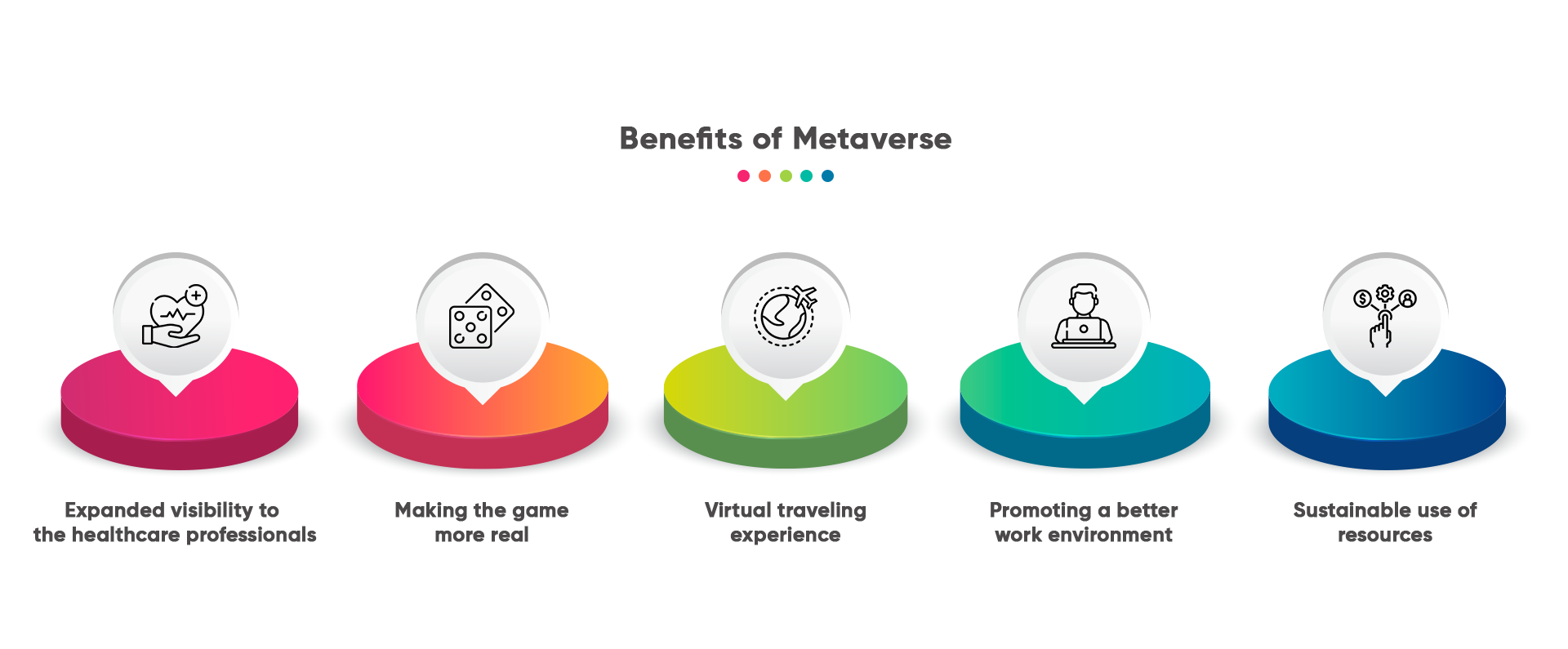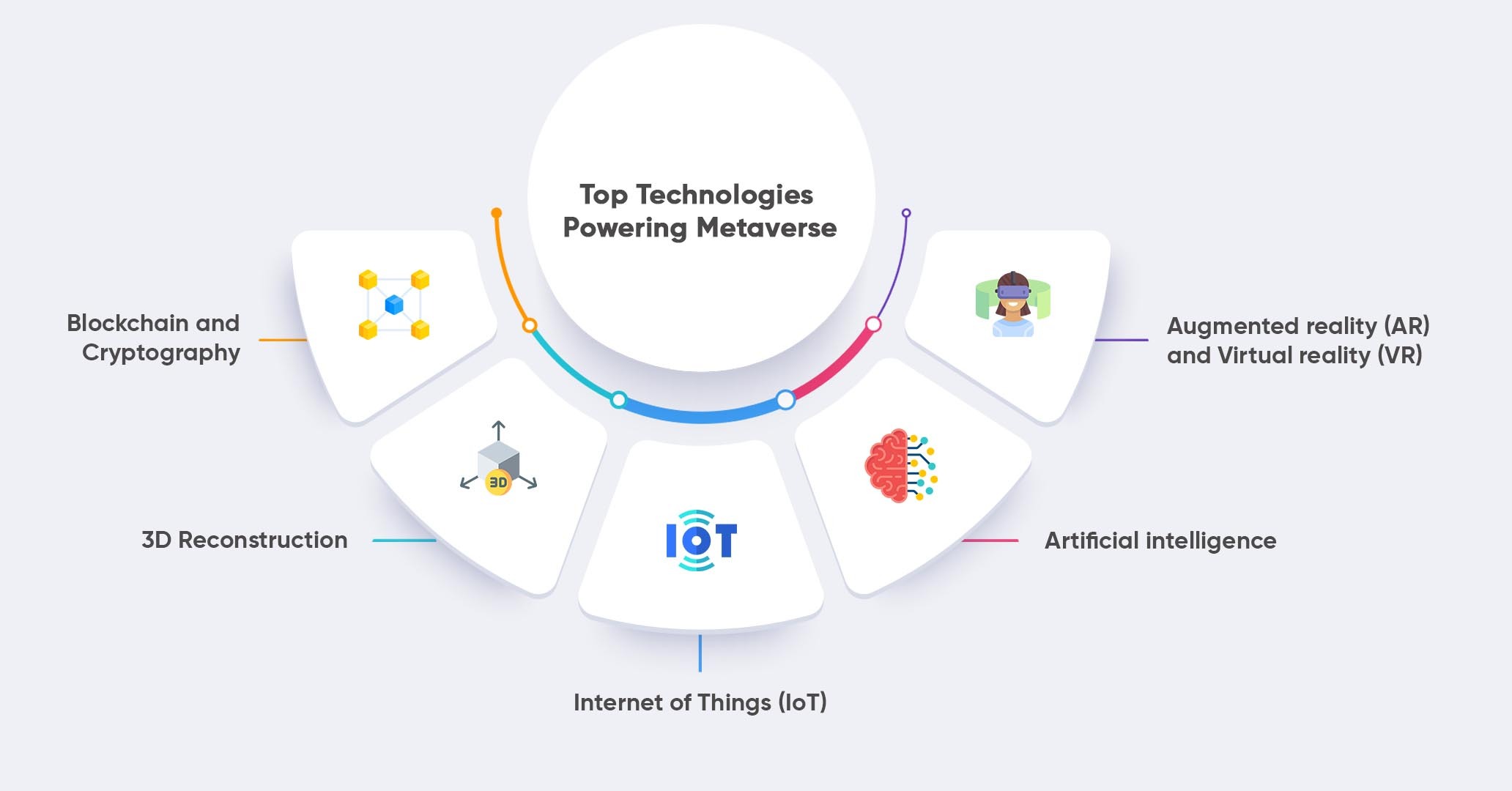Metaverse is the next evolution of the internet and social network connection. In this article, we will learn the different use cases and benefits of the metaverse and its impact on the digital world.
The world is now a global city, and the internet has upgraded human connections and presence with the help of a solid digital evolution. Metaverse is the future of the internet, and they center it on virtual reality, augmented reality, blockchain, and cryptocurrency. This evolution of the internet will give us a parallel virtual universe- a digital world of innovations and advancements.
Before we discuss more metaverse use cases and their benefits, let’s have a look at some of the basics.
- What is metaverse?
- What are the benefits of metaverse?
- Emerging and future metaverse use cases
- Top technologies powering metaverse
- Challenges faced in metaverse adoption
- Closing thoughts
What is metaverse?
Metaverse is the new buzzword in tech. To understand it better, let us first know how the internet is used to interact with people digitally by using social media, emails, texts, or video calls. This technology aims to take this experience a notch higher. The idea is to create a new online space where the users can immerse themselves in the digital content and interact by creating avatars. Metaverse is a virtual world that fuses different digital technologies- social networks, virtual reality, and videoconferencing. Facebook has announced that they will move from their social media company to a metaverse development company in the next five years and have promised 10000 new jobs in the EU using this technology. This technology aims to create a new communication medium in every way possible with all aspects of life.
What are the benefits of metaverse?
Expanded visibility to the healthcare professionals:
Metaverse will help bring healthcare facilities closer to every patient. It will bridge the gap between geographical limitations and help the healthcare professionals have a clear insight into the health conditions of the people.
Medical wearables in Metaverse:
Medical wearables empowered physicians and patients will provide the much-needed health data and reports which will be needed by the healthcare professionals. This data visualization will be important to make well-informed decisions about the patients.
Transforming Family Visits to Patients through Virtualization:
Due to the pandemic, patient visits are mostly restricted in many hospitals. However, with the help of metaverse, we can augment these visits with a virtual office where the patients and their friends or family can meet in a 3D clinic or any other location giving a better user experience through telecommunication services.
Metaverse Technology Will Transform Surgery:
Surgeons can meet in the virtual operation theaters and consult with other experts and take their assistance in conducting and monitoring the surgery. Metaverse will help in better image visualization, which can help the radiologists in timely diagnosis and treatment.
Making the game more real:
We model games in this era on a decentralized economic model which helps the users and the publishers to sell their in-game assets or NFT tokens. Creating in-game avatars and making them play in the virtual space makes the gaming experience even more exciting for the users.
Games-as-platforms:
This will make the gaming experience more flexible as it will give the users the opportunities to build their own sub-games, game content and create their own game characters opening up spaces for other activities.
Social gaming:
Multiverse will enable players to interact and invite friends from the real world which will help to build better social interactions in the gaming world.
Play-to-earn:
One of the best elements of gaming in the metaverse is that the players can earn profits by selling their in-game assets in return for crypto coins.
Portable game experience:
Metaverse enables asset portability, so the weapons or avatars in one game can be ported to another environment following the NFT rules.
Mixed reality experience:
Metaverse gaming incorporates mixed reality where the users can move from group text in AR to an MR board to a VR world seamlessly.
Examples of some of the most played metaverse games are:
- Sandbox
- Axieinfinity
- Sorare
- Illuvium
- Ultra
Related articles on Where will NFTs pop up next?
Virtual traveling experience:
Although everyone loves traveling, not everyone has the luxury of physical capabilities to travel to every place they wish to visit. Here, metaverse with the help of AR and VR can create a virtual world where people can have real-life experiences of the places they wish to travel.
Test drive excursions and attractions:
Virtual reality can help travelers to test drive various trips and have a virtual tour of the places they want to visit. This will help them decide where to spend their money and make their holidays more worthwhile. Virtual excursions will provide a better idea of the places the customers want to experience.
Immersive navigation:
Once you have chosen your destination through the VR test drive, you can now reach the desired location. But what if you cannot reach the desired landmark? Well, here with the help of AR-infused navigation, you will navigate and reach the destination as planned. The idea is simple, which is to guide the users using the Google Maps apps and AR-enabled devices to help with the direction. These AR-enhanced route-finding methods will make international travel easier.
Completely New Economy:
Metaverse helps in the trade of assets across different spaces in the metaverse world. Here, for example, you can sell an NFT created on a particular game to another game or platform in the metaverse. Using metaverse blockchain use cases of NFT, DeFi will help in creating a completely new economy in the metaverse
Promoting a better work environment:
Metaverse can help employers resolve the problems of productivity time of the employees by keeping track of them by creating avatars and interacting with them in the virtual space. This will also enable the employer to better understand his employee’s behavioral issues.
Diminishing the negatives of remote work:
Metaverse will help the employees or team members to meet in the virtual spaces as 3D avatars, which will make them feel way closer and feel like a real world. It will also remove the feeling of being disconnected and will benefit the managers by employee engagement.
Visualize and solve problems in 3D:
The 3D nature of Metaverse will allow more precise assessment and decision making along with less financial cost. This will help in better problem-solving.
No dependence on hardware and no restrictions of space:
There will never be an issue of space in the virtual world as it can be expanded easily. Hardware uses will be less, therefore 3D avatars can meet each other without the need for any conferencing equipment.
Sustainable use of resources:
Attending workplaces, schools, social gatherings online in the virtual space will help save a lot of resources. Rich or poor won’t matter because every stratum of society will get the same quality of virtual experience.

Emerging and future metaverse use cases
Have a walkthrough into some of the emerging and future metaverse use cases:
Advanced blockchain use cases:
Metaverse can only function with decentralized technology or blockchain. Blockchain helps create NFTs and Dapps, which can be used with this technology to create better user experiences. Companies can use this technology to help the buyers with a better buying experience and a realistic approach to shopping. This technology also allows gamers by creating avatars and buying in-game assets in the virtual space, thus improving the users’ gaming experience.
Virtual work and learning spaces:
Because of the pandemic, many workplaces are adapting to the work-from-home culture because of which digital modes of communication are becoming a mandate in the workspace. But since we limit the interaction to audio and video, real-time communication is not possible. Metaverse helps solve this problem by providing the users with a more engaging experience by assisting them to create 3D avatars which can help them navigate through the virtual space of real-life participants.
Virtual businesses and markets:
Metaverse technology is helping businesses with better opportunities and assisting the users with a 3D environment where they can visualize and purchase items. E-commerce business owners can now easily interact, store, trade, and engage with customers and merchants, hence providing realistic marketing content to the users.
It also helps create, own, and trade digital assets such as NFT and tokenized versions of crypto, which can be a boon to the crypto world.
Related article on How to build a metaverse virtual world?
Expansion of social media platforms:
We have seen the technology move from text-based chats to audio to video calls, but Metaverse can provide the users with much more. Metaverse can provide people with an actual life experience of communication by enticing a feeling of presence in them. Metaverse, along with augmented reality and 3D videos, will enable a far more engaging social media experience for the users where they can feel and respond in their virtual universe.
Unlocking Marketing Prospects:
Metaverse is based on the virtual world and brands can use this opportunity to capitalize on different marketing opportunities in these virtual worlds. Users can now shop and communicate through their digital avatars in the metaverse. Metaverse will enable e-commerce sales where people can outfit their avatars to explore the virtual world. For example, branded clothes worn by the characters in the game will offer better brand exposure. Brands can now turn shopping into a 3D experience.
Web Real-time Communication:
Metaverse offers real-time communication, providing direct communication between the browsers. This method will transform the conventional methods used for audio and video communications. It provides favorable conditions for real-time communication using multiple media streams and immediate transfer of communication among the clients.
Create a virtual learning space at home:
As we all know, this pandemic has forced students to go online for their education. The interaction between the teachers and students is mainly through videoconferencing and online classes, but there are certain barriers that can’t be overcome by such technologies. Here, metaverse comes into play as it promises joined-up online classes where the students can experience a cyber-physical online experience where the real world meets with the virtual world. This virtual space will help the students to practice skills that would have been difficult to practice in the real world online learning.
Related article on What is Digital Twin Technology and what are its use cases in the Metaverse?
Top technologies powering metaverse
Companies are on a mission to make Metaverse more immersive. For this, they are using leading technologies such as blockchain, augmented reality, artificial intelligence, IoT, 3D construction to power the virtual third-dimensional world. Let’s understand these technologies and augment the Metaverse.
Blockchain and cryptography:
Blockchain and cryptocurrencies are an essential part of the development of Metaverse in the digital space. Blockchain helps in the decentralized trade and operations of digital assets and helps with a transparent digital proof of ownership. Cryptocurrencies act as a medium of exchange between transferring value to the users while exploring the virtual space. Such possibilities will help with breathtaking innovations in the blockchain-based virtual world.
3D reconstruction:
Because of lockdown and the pandemic, people are a little skeptical about stepping out and purchasing the properties in person. Real estate owners took this opportunity to involve 3D technology where potential buyers can check on the property, which can intensify their experience and help them decide. Just like Metaverse,3D technology allows the users with a real-life experience in the virtual world where they get to experience near-to-life images to choose from.
Artificial intelligence:
Metaverse needs artificial intelligence and AR/VR to create scalable and accurate virtual worlds. Regardless of the project type, AI is a mandatory part of our day-to-day life.AI will enable multilingual abilities, real 3D avatars, intuitive interfacing, data processing, etc., in the Metaverse, which will help with the user experience every time they enter the virtual world.
Augmented reality (AR) and virtual reality (VR):
AR and VR are crucial to Metaverse as it provides the users with the 3D experience for the virtual world. The capabilities of both AR and VR are the starting point of the Metaverse. These technologies are advancing daily hence defining the digital experiences drastically.AR and VR encourage many businesses to accommodate future metaverse use cases.
Internet of things (IoT):
IoT brings together the physical world and the virtual world together. The IoT data feeds help determine the functioning of the objects within the virtual world based on the changing environment in the real world. It connects the 3D virtual world to real-world devices, which helps in connecting the real-world processes in a digitally interoperable infrastructure.

Challenges faced in metaverse adoption
Metaverse is promising, but it has its own sets of challenges like any other technological advancement. This technology is in its initial stage and rapidly growing, so it involves many challenges. Given below are some challenges faced while implementing this technology.
- Though tough to admit, it is difficult to identify people in the virtual world. When you are in the virtual world, it is difficult to identity verification and authentication the different avatars.
- Since buying and selling virtual lands are becoming common in virtual worlds, ownership issues of digital assets arise.
- Content creators on the metaverse will find it difficult to protect their intellectual property, as tracking instances of copyright infringement in the virtual world will be difficult.
- One of the major concerns can be privacy, where many personal data can be leaked as this technology depends upon AR and VR devices which have their own identifiers and camera capabilities.
- Currency and payment systems in the virtual world will be a problem as it will be difficult to convince people to rely on and feel safe while engaging in any kind of trade in the virtual world.
Closing thoughts
Metaverse is the next iteration to the internet- immersive, virtual, and interactive. However, it is also a virtual world full of opportunities and challenges. We are the ones who are setting up the virtual world, but we should always make sure that it is not replacing the real world that we are living in. As much as we are eager to step into it, it is also essential to remain safe in this vast virtual world. So let’s wait and watch what surprises the virtual world holds on for us.


